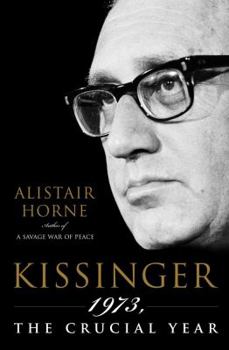Kissinger: 1973, the Crucial Year
Select Format
Select Condition 
Book Overview
Kissinger: 1973, The Crucial Year is the gripping history of one of America's most enigmatic and influential foreign policy advisers during a pivotal year in the country's postwar history. By any measure, 1973 was not an ordinary year. It should have been Kissinger's year of triumph -- a time to bask in his hard-won achievements and build on his successes. Kissinger's strategy of opening the door to China and d?tente with the Soviet Union had been judged an overwhelming success. After furthering his policy of realpolitik through backchannel diplomacy during Nixon's first term, Kissinger was finally awarded the plum position of secretary of state. But then major events shattered whatever peace and calm America had attained in the early part of the decade: first came defeat in Vietnam; then Watergate, culminating in the president's resignation; war in the Middle East; and finally an economic collapse caused by the Arab oil embargo. All of these momentous blows to the country's security occurred on Henry Kissinger's watch. Rather than progressing on all fronts, as he had expected, Kissinger would confront some of the most critical policy challenges of his career. Based on full access to the subject and his papers, Kissinger is an intimate portrait of a man, a country, and a presidency at a critical point. From the blowup in the Middle East, to d?tente with Russia, to the opening of the door to China, the United States' response to the pivotal events of 1973 -- and Kissinger's crucial role in the formulation of that response -- continues to shape and influence United States foreign policy today.
Format:Hardcover
Language:English
ISBN:0743272838
ISBN13:9780743272834
Release Date:June 2009
Publisher:Simon & Schuster
Length:457 Pages
Weight:1.60 lbs.
Dimensions:1.4" x 6.4" x 9.3"
Customer Reviews
2 ratings
Good but Flawed
Published by Thriftbooks.com User , 15 years ago
Though Mr Horne is an accomplished historian, he trolled too close to the trees to see the Kissinger forest. Interesting anecdotes aside, his accounting of a pivotal year in the career of the refugee from Hitlerite Germany seems too starry eyed about the dubious achievements of his subject. Way too dismissive of Kissinger's role in the Allende tragedy (if not outright fascist in his treatment of the Chilean), he glosses over most of Kissinger's other crimes because those would diminish the profile Horne wishes to paint. Fine for hagiography, but one expects more from an unbiased historian of international repute. But Horne makes it obvious he will only allow reactionary, right wing perspectives; not for him any leftist skew of the world. Next time, Mr Horne, spend less time being wined and charmed at your subject's home and more on scrutiny, skepticism and objectivity.
A noted historian's Kissinger retrospective
Published by Thriftbooks.com User , 15 years ago
Thirty five years after Richard Nixon's August 1974 resignation as president, the well regarded English historian, Alistair Horne, has written an informative and balanced examination of Henry Kissinger's 1973 tenure as Nixon's national security director and secretary of state. Horne travels a long road focusing on Henry Kissinger's first trip to China, followed by Nixon's 1972 trip, the 1973 Paris peace talks, the US's detente with Russia, the failed Year of Europe, the 1973 Yom Kippur War and his famous shuttle diplomacy securing Israel's final Sinai withdrawal; all heavily overlaid with the looming Watergate scandal and its impact leading to Nixon's resignation. Horne's credentials as a judge of history are impressive and he does not fail the reader. The book is convincing with facts and quotes and a thorough synthesis of memoirs, interviews and other source material. He does not skimp with details and provides interesting cameos and asides of the major players. This is true history told from the perspective of time and reflection; his conclusions are dispassionate and sensible. One is fascinated with Kissinger's adroitness in handling negotiations with Brezhnev, Sadat, Zhou En Lai, Golda Meir and the subtle nuances of his diplomacy forcing the withdrawal of the Israelis from the Sinai. Fact checking gaffes however mar the story line; he confuses "John McCord" and "James McCord" of Watergate infamy, there was only one James McCord, a defendant in the first Watergate trial. His claim that the House of Representative had no power over Kissinger ignores the House's power of the purse and the power of subpoena. Horne's claim that Nixon was "incapacitated" for DEFCON 3 and that this was one of "the most critical meetings in US - indeed, world- history since 1945" is an exaggeration. Horne's jumps on George W. Bush contending he fired one of his White House chief of staff but that contention has no basis. Rightly turning on the Watergate media, "the witch doctors of the media," he sees a feeding frenzy on Nixon and Kissinger with adverse historical consequences for American foreign policy. What is notable is that this is a balanced treatment of Richard Nixon foreign policy contributions without the typical slanted American scream.






